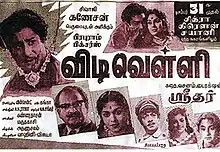| Vidivelli | |
|---|---|
 Theatrical release poster | |
| Directed by | C. V. Sridhar |
| Written by | C. V. Sridhar |
| Produced by | Sivaji Ganesan |
| Starring | Sivaji Ganesan B. Saroja Devi |
| Cinematography | A. Vincent |
| Edited by | N. M. Shankar |
| Music by | A. M. Rajah |
Production company | Prabhuram Pictures |
| Distributed by | Sivaji Films[1] |
Release date |
|
Running time | 126 minutes |
| Country | India |
| Language | Tamil |
Vidivelli (transl. The Morning Star)[2] is a 1960 Indian Tamil-language film written and directed by C. V. Sridhar. The film stars Sivaji Ganesan, B. Saroja Devi and M. N. Rajam; Ganesan also produced it under Prabhuram Pictures, a subsidiary of his own company Sivaji Films. The film focuses on a brother who steals a diamond necklace for his sister's happy life. But the necklace itself becomes a problem. The rest of the story deals with what is the secret of the necklace and how the brother solves this puzzle.
Vidivelli was released on 31 December 1960. The film was a critical and commercial success, running for over 100 days in theatres.
Plot
Chandru has a sister Meena who is married to Ravi. But her in-laws insist on a diamond necklace, sans which she cannot join her husband. Hence, Chandru steals a diamond necklace with a locket and then Meena joins her husband. He and his mother move to Madras, where the former obtains employment. Chandru falls in love with his boss's daughter Chitra. One day, the necklace falls down and the locket opens, revealing the photograph of a man. Ravi and his family want to know who he is. Meena says she has never seen him before. But suspecting the worst, she is sent back to her old home.
After Chandru saves his boss from a large loss, the boss gives him a large sum of money in gratitude. Chandru purchases another necklace using that money and Meena goes back to her husband. However, Chandru's boss dismisses him to keep him away from Chitra. Chandru surrenders to the police station for the theft. He later realises that the earlier necklace belongs to Chitra, and the man in the locket is her brother who died at war. However, Chitra's father denies ever having had a son. The rest of the film deals with how the puzzle is solved.
Cast
|
|
Production
In 1953, M. G. Ramachandran intended to produce a film titled Vidivelli with M. Karunanidhi writing; however, the project was dropped after Karunanidhi's arrest for participating in the Kallakudi demonstration that year.[4] The title was later used for an unrelated film written and directed by C. V. Sridhar and produced by Sivaji Ganesan under Prabhuram Pictures, a subsidiary of his company Sivaji Films. Cinematography was handled by A. Vincent, editing by N. M. Shankar, and art direction by Ganga.[5][3]
Soundtrack
The soundtrack album was composed by A. M. Rajah while the lyrics were written by Kannadasan, A. Maruthakasi and Ku. Ma. Balasubramaniam.[6][7]
| No. | Title | Lyrics | Singer(s) | Length |
|---|---|---|---|---|
| 1. | "Idai Kai Irandil Aadum" | Kannadasan | A. M. Rajah, P. Susheela | 03:20 |
| 2. | "Koduthu Paar" | A. Maruthakasi | A. M. Rajah, P. Susheela, Thiruchi Loganathan, Jikki | 03:29 |
| 3. | "Naan Vaazhndhadhum" | Kannadasan | Jikki | 03:11 |
| 4. | "Ninaithaal Inikkum" | A. Maruthakasi | Jikki | 02:40 |
| 5. | "Pannodu Pirandhadhu" | Kannadasan | P. B. Sreenivas, Jikki | 03:48 |
| 6. | "Aadamal Aadugiren" | A. Maruthakasi | P. Susheela | 04:05 |
| 7. | "Ennaalum" (Pathos) | A. Maruthakasi | P. Susheela | 03:21 |
| 8. | "Ennaalum Vaazhviley" (Happy) | A. Maruthakasi | P. Susheela | 04:00 |
| 9. | "Kaaru Savarijhoru" | Ku. Ma. Balasubramanian | Jikki, Thiruchi Loganathan | 03:33 |
| Total length: | 31:27 | |||
Release and reception
Vidivelli was released on 31 December 1960.[5] In a review published on 8 January 1961, the critic from The Indian Express praised the performances of the cast, particularly Ganesan, Saroja Devi, Balaji and Santhakumari, and Vincent's cinematography.[8] Kalki also appreciated the film for various aspects, including the story, direction and cast performances.[9] The film was a critical and commercial success,[10] running for over 100 days in theatres.[11]
References
- ↑ "Vidi Velli". The Indian Express. 25 December 1960. p. 3. Retrieved 17 August 2021.
- ↑ Baskaran, S. Theodore (2008). Sivaji Ganesan: Profile of An Icon. Wisdom Tree. p. 89. ISBN 978-81-8328-396-0.
- 1 2 3 4 5 6 7 8 9 Guy, Randor (24 August 2013). "Vidivelli (1960)". The Hindu. Archived from the original on 10 September 2013. Retrieved 5 March 2019.
- ↑ Sri Kantha, Sachi (6 March 2015). "MGR Remembered – Part 25 | Nadodi Mannan aka The Vagabond King". Ilankai Tamil Sangam. Archived from the original on 3 April 2019. Retrieved 3 April 2019.
- 1 2 "Vidivelli". The Indian Express. 31 December 1960. p. 10. Retrieved 5 March 2019.
- ↑ "Vidivelli (1960)". Raaga.com. Archived from the original on 17 March 2014. Retrieved 11 July 2016.
- ↑ விடிவெள்ளி (PDF) (song book) (in Tamil). Prabhuram Pictures. 1960. Retrieved 22 July 2022.
- ↑ "Vidi Velli". The Indian Express. 8 January 1961. p. 3. Retrieved 5 March 2019.
- ↑ "விடிவெள்ளி". Kalki (in Tamil). 22 January 1961. p. 51. Archived from the original on 14 October 2022. Retrieved 14 October 2022.
- ↑ நரசிம்மன், டி.ஏ. (27 April 2018). "சி(ரி)த்ராலயா 15: காஷ்மீரில் கட்டிப்போட்ட சலுகை!". Hindu Tamil Thisai (in Tamil). Archived from the original on 28 April 2018. Retrieved 9 May 2018.
- ↑ Ganesan, Sivaji; Narayana Swamy, T.S. (2007) [2002]. Autobiography of an Actor: Sivaji Ganesan, October 1928 – July 2001. Chennai: Sivaji Prabhu Charities Trust. p. 241. OCLC 297212002.